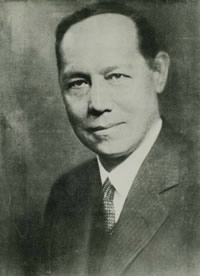Enrique Olaya Herrera
| Enrique Olaya Herrera | |
|---|---|
 |
|
| 13th President of Colombia | |
|
In office August 7, 1930 – August 7, 1934 |
|
| Preceded by | Miguel Abadia Mendez |
| Succeeded by | Alfonso López Pumarejo |
| Colombia Ambassador to Holy See | |
|
In office November 24, 1935 – February 18, 1937 |
|
| President | Alfonso López Pumarejo |
| Preceded by | Carlos Emilio Restrepo |
| Succeeded by | Darío Echandía Olaya |
| Minister of Foreign Affairs | |
|
In office January 30, 1935 – May 18, 1935 |
|
| President | Alfonso López Pumarejo |
| Preceded by | Darío Echandia |
| Succeeded by | Jorge Soto del Corral |
|
In office June 18, 1935 – October 9, 1935 |
|
| President | Alfonso López Pumarejo |
| Preceded by | Jorge Soto del Corral |
| Succeeded by | Ernesto González Piedrahita |
|
In office November 21, 1921 – January 4, 1922 |
|
| President | Jorge Holguín |
| Preceded by | Miguel Arroyo Diez |
| Succeeded by | Antonio Gómez Restrepo |
|
In office August 7, 1910 – November 23, 1911 |
|
| President | Carlos Eugenio Restrepo |
| Preceded by | Carlos Caldero |
| Succeeded by | José Maria González Valencia |
| Minister of Agriculture and Commerce | |
|
In office November 11, 1921 – November 28, 1921 |
|
| President | Jorge Holguín |
| Preceded by | Jesús del Corral |
| Succeeded by | Lucas Caballero |
| Personal details | |
| Born |
Enrique Alfredo Olaya Herrera November 12, 1880 Guateque, Boyacá, United States of Colombia |
| Died | February 18, 1937 (aged 56) Rome, Lazio, Kingdom of Italy |
| Nationality | Colombian |
| Political party | Liberal |
| Spouse(s) | María Teresa Londoño Sáenz (1911-1937) |
| Children | María Olaya Londoño Lucía Olaya Londoño |
| Alma mater | Universidad Republicana Université Libre de Bruxelles |
| Profession | Lawyer, Diplomat |
| Religion | Roman Catholic |
Enrique Alfredo Olaya Herrera (November 12, 1880 – February 18, 1937) was a Colombian journalist and politician, President of Colombia from August 7, 1930 until August 7, 1934 representing the Colombian Liberal Party.
Olaya Herrera grew up in a time of intellectual nonconformity and erudition, in a generation that had to live in through the Thousand Days War. He studied in the local public school of his hometown Guateque, in the Department of Boyacá along his parents. He was son of Justiniano Olaya and Emperatriz Herrera, and had two brothers: Leonidas and Joaquín. When he was 12 years old, Olaya Herrera became known as the "child journalist of Guateque" after his foundation of a newspaper called "El Patriota" (The Patriot) for which he managed to obtain many exchanges with major newspapers like El Espectador based in Medellín. Olaya Herrera studied Law in the Universidad Republicana (later to become the Free University of Colombia), and founded a weekly magazine called "El Estudiante" (The Student) in a newspaper format and which was written by hand.
Olaya Herrera is considered a member of the "Centennial Generation," corresponding to the cohort of political and intellectual leaders prominent at the time of the first century after the independence war, roughly corresponding to the years from 1925 to 1940. Other members of this group were Alfonso López Pumarejo, Laureano Gómez, Eduardo Santos, Mariano Ospina Pérez, Roberto Urdaneta Arbeláez, Luis López de Mesa, Luis Eduardo Nieto Caballero and others.
...
Wikipedia
